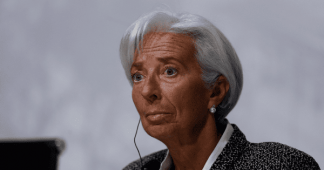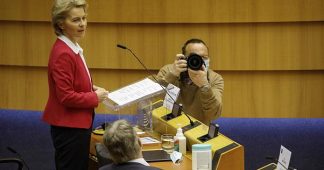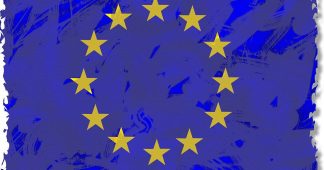Euro Group discusses economic development and calls for “reform programs”
By Steffen Stierle, Junge Welt (jw)
19 January 2021
In the Corona crisis, the already large economic differences between the euro countries continue to increase. This is shown by an analysis of the EU Commission, which was discussed via the Internet at a meeting of the Euro Group on Monday. The finance ministers want to find a remedy by linking aid money to “reform conditions.”
For this reason, all member states that want to benefit from the “Next Generation EU” fund currently have to draw up so-called reconstruction plans. The framework was set by the Council in November. According to these plans, the allocation of funds is accompanied, for example, by the obligation to drive forward the digital transformation and to invest in climate-friendly technologies. But labor market liberalization is also an issue, for example when it is required to “support the development of human capital and successful job changes.”
In addition, Brussels expects the reform programs to already include a return to strict budget discipline: As soon as possible, “a reorientation of fiscal policy (…) – including by ending support measures for businesses and citizens – should help ensure the sustainability of public finances in the medium term,” the analysis paper says.
So now it’s a matter of checking whether the euro countries’ reform plans are in line with the Council’s and the Commission’s ideas. Only then can the funds flow. The German Ministry of Finance assumes that disbursements cannot begin until the middle of the year at the earliest. Brussels’ response to the first wave of the corona pandemic would then come months after the first anniversary of the outbreak.
According to a preparatory document available to jW, the German government wants to ensure in the debate that member countries “set out in national plans how they will increase the growth potential and resilience of their economies through reforms and targeted investments.” A separate recovery plan had already been adopted in December and submitted to the Commission. This is to be finalized by the end of April. Finance Minister Olaf Scholz (SPD) can expect Germany to receive around 23 billion euros from the EU pot.
Another major topic discussed by the Euro Group was the increasing economic imbalances. For months, BRD’s crisis politicians in particular have been aiming to use the favor of the hour by providing substantial state subsidies for industry and finance to further expand their supremacy in the cartel of states and counteract the loss of power caused by the “Brexit.”
As a “technical note” from the Commission in preparation for the Eurogroup debate shows, Brussels analysts expect these economies to drift significantly apart during the crisis. A number of existing imbalances are currently worsening, they say. For example, the agency points out that the pandemic has so far had the strongest impact in those member states that were already characterized by relatively high levels of public and private debt before the crisis. In addition, these are often countries in whose economic structure tourism plays a particularly important role.
The Commission also emphasizes that the Corona crisis is “fundamentally different” from the 2008 financial crisis and is not the result of “financial excesses. Nevertheless, the reform goals formulated are similar to those from the “troika” times. For example, the measures are intended to increase productivity, ensure that the markets function smoothly and make the administration more effective.
What is ultimately negotiated in the Euro Group is often under the “guiding principle” of the specific definition of a European solidarity. When Brussels talks about solidarity, it is about a performance for which something in return is demanded. The service is loans or grants. The quid pro quo is “reform programs” in the sense of neoliberal EU economic policy.
Translated with www.DeepL.com/Translator (free version)











